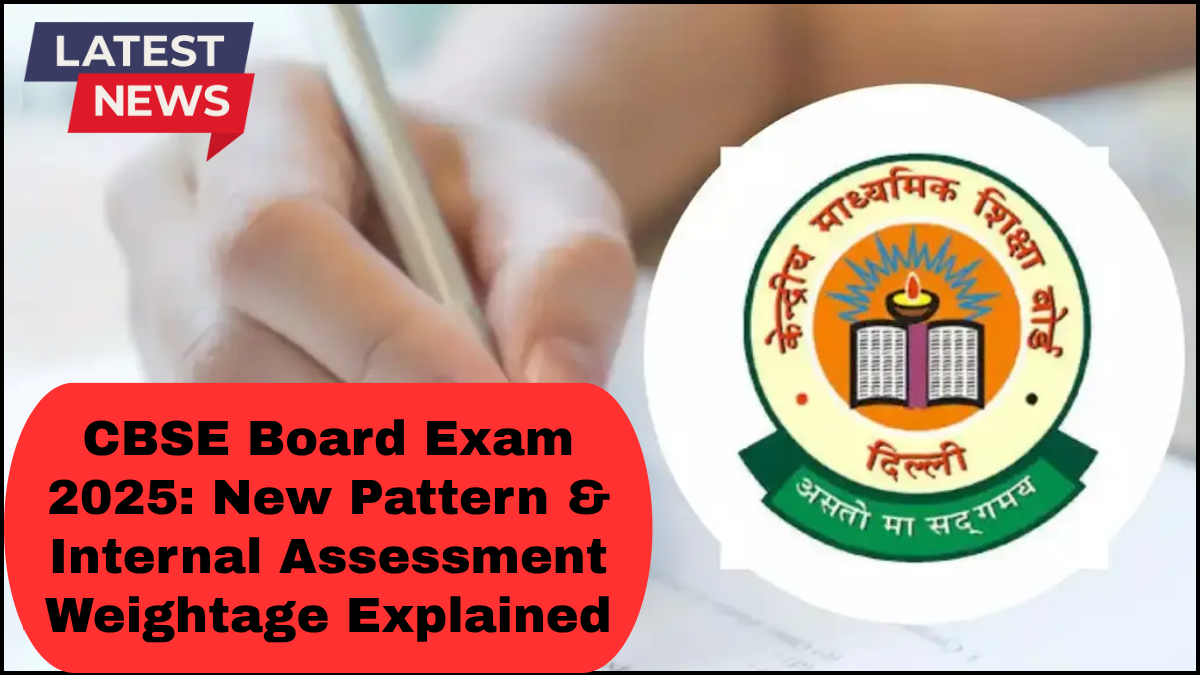The Central Board of Secondary Education (CBSE) has officially announced a major shift in the examination structure for the academic year 2024–25. The CBSE board exam 2025 new pattern is designed to emphasize conceptual understanding, reduce rote learning, and prepare students for real-world application of knowledge. Alongside this, internal assessment updates aim to make continuous evaluation more meaningful and integrated with classroom learning.

Here’s everything students, teachers, and parents need to know about the revised CBSE exam framework.
What’s New in the CBSE Board Exam 2025 Pattern?
The CBSE board exam 2025 new pattern follows the guidelines of the National Education Policy (NEP) 2020 and brings a more competency-based approach to testing. The traditional model that relied heavily on memory-based questions is being phased out.
Here’s a breakdown of the revised structure:
-
Competency-Based Questions:
For Class 10 and 12 board exams, 50% of the paper will now consist of competency-based questions. These include:-
Case-based questions
-
Source-based integrated questions
-
Situation-based and application-driven problems
-
-
Objective Type Questions:
Around 20% of the paper will include multiple-choice questions (MCQs), assertion-reason type, and very short answer questions. This is designed to test precision and clarity of understanding. -
Subjective/Short Answer Questions:
The remaining 30% will focus on short and long-form answers that test analytical and critical thinking skills, instead of just factual recall.
This restructured blueprint promotes deeper learning, discourages rote memorization, and rewards analytical thinking.
Internal Assessment Updates: Stronger Focus on Continuous Evaluation
The new approach also includes significant internal assessment updates to complement the changes in the final exam.
Key Highlights:
-
Weightage of Internal Assessment:
-
Class 10: Internal assessments now hold a 20% weightage.
-
Class 12: For subjects that include project work, practicals, or internal assessment, this portion remains at 20–30%, depending on the subject.
-
-
More Comprehensive Evaluation Tools:
-
Periodic tests (unit tests)
-
Multiple assessment methods like quizzes, oral tests, and concept maps
-
Subject enrichment activities
-
Portfolio submissions that reflect consistent performance and progress
-
-
Digital Integration:
Schools are now encouraged to use online tools and CBSE’s Learning Management System (LMS) to track and record student progress. This makes the process more transparent and tamper-proof.
The revised internal assessment model pushes schools to engage students in ongoing, meaningful assessments rather than one-off tests.
Impact on Students and Teachers
The CBSE board exam 2025 new pattern has significant implications for both teaching and learning:
-
For Students:
The focus shifts from cramming information to understanding core ideas. Students will need to practice writing responses that apply concepts to real-life contexts and hone their analytical thinking. -
For Teachers:
Lesson planning must now align with higher-order thinking skills. Training and workshops are being organized by CBSE to equip teachers to implement this effectively.
Preparation Strategy for the 2025 Board Exams
To succeed under the new format, students should adapt their study approach:
-
Master Concepts: Go beyond textbook summaries. Understand the ‘why’ and ‘how’ of topics.
-
Practice Case-Based Questions: Solve mock tests that include scenario-based problems.
-
Regular Self-Assessment: Use internal quizzes, flashcards, and online tools to reinforce learning.
-
Stay Updated: Follow CBSE circulars, sample papers, and official notifications regularly.
FAQs on CBSE Board Exam 2025 New Pattern & Internal Assessment
Q1: Is the CBSE board exam 2025 new pattern applicable to all subjects?
Yes, the new pattern applies to all major subjects for both Class 10 and Class 12. The question paper format has been updated accordingly.
Q2: Will the marks distribution change due to the new pattern?
While total marks remain the same, the distribution of question types—competency-based, objective, and subjective—has been modified.
Q3: What are the key internal assessment updates for Class 10?
Internal assessment now includes a mix of unit tests, portfolios, and enrichment activities with a 20% overall weightage in the final score.
Q4: How should students prepare for competency-based questions?
Students should practice applying theoretical knowledge to real-life problems. CBSE sample papers are a good starting point.
Q5: Will this new pattern reduce academic pressure?
Yes, the aim is to reduce exam stress by evaluating understanding over memorization and encouraging consistent learning throughout the year.
click here to learn more